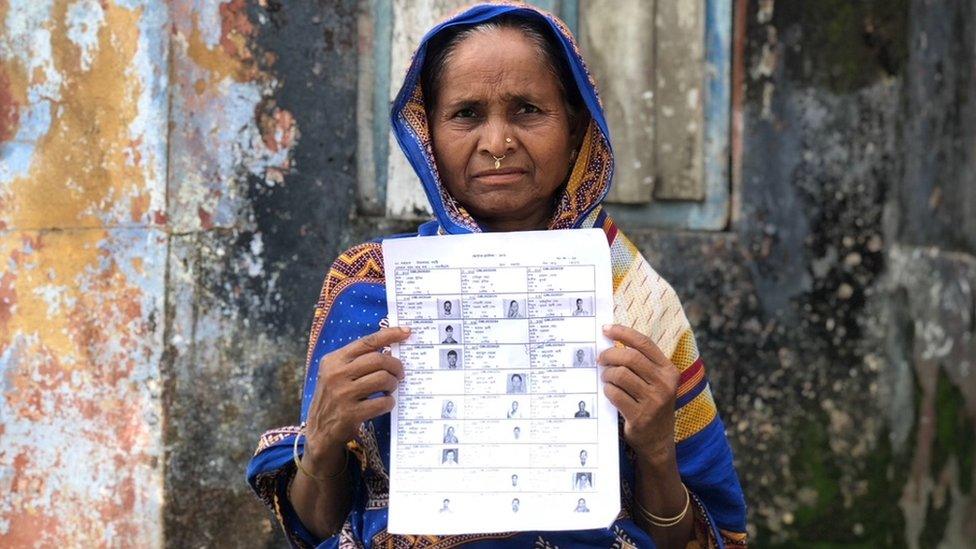Assam citizenship bill: Anti-migrant protests rock north-east India
- Published
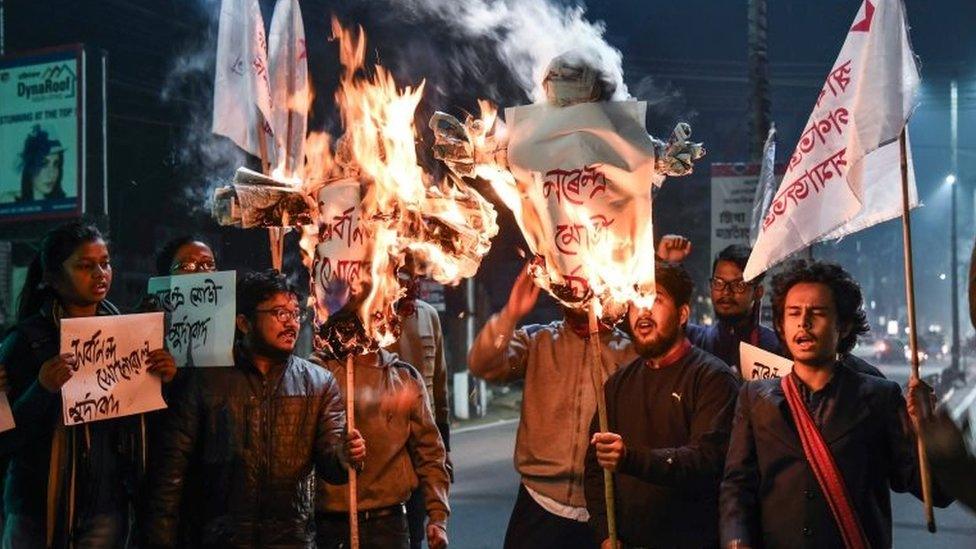
Protesters have burnt effigies of PM Narendra Modi
Violent protests are continuing in India's north-eastern states over a proposed amendment to the country's citizenship law.
The protests have been particularly vocal in the state of Assam, which recently saw four million residents left off a citizens' register.
The bill attempts to grant citizenship to immigrants who are not Muslim.
Students, activists, politicians and celebrities have all joined the protests against India's ruling party.
What does the bill say?
The Citizenship (Amendment) bill seeks to provide citizenship to non-Muslim migrants from Pakistan, Bangladesh and Afghanistan.
Supporters of the bill defend it by saying that Muslims have been excluded as the bill offers Indian nationality only to religious minorities fleeing persecution in neighbouring countries.
It comes months after the publication of the National Register of Citizens (NRC) - a list of people who can prove they came to the state by 24 March 1971, a day before neighbouring Bangladesh became an independent country. Around 3.62 million of those left off the register have submitted claims for inclusion again.
Living in limbo: Assam's four million unwanted
India said the process was needed to identify illegal Bangladeshi migrants.
Thousands of students have joined writers, artists and activists in regular protests against the bill, fearing that tens of thousands of Bengali Hindu migrants who were not included in the NRC may still get citizenship to stay on in the state.
How bad are the protests?
Offices of the Bharatiya Janata Party (BJP), which runs both the federal government and Assam's state government, have been burnt down by angry mobs in many places.
Protesters have also frequently surrounded the state secretariat in the capital, Guwahati, demanding the shelving of the amendment.
Some supporters of Assamese peasant leader Akhil Gogoi even staged a nude protest in the national capital, Delhi, earlier this month.
"The movement against the bill has gained momentum across the north-east and if it is not withdrawn, the situation in the region may turn volatile," Sammujal Bhattacharyya of the All Assam Students Union (Aasu), which is leading the protests against the bill in Assam, told the BBC.
He said it was an attempt to provide citizenship "by backdoor" to illegal non-Muslim migrants who were excluded from the NRC.
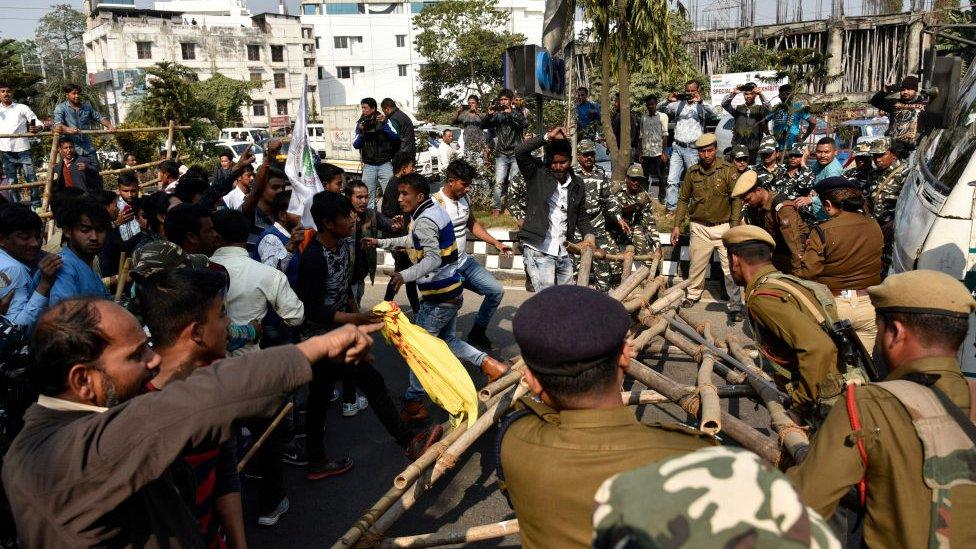
Assam has seen vocal protests against the bill
In the early 1980s, Aasu was behind the anti-migrant protests in Assam that paralysed the state and degenerated into rioting that led to more than 3,000 deaths.
The agitation ended in 1985 after March 1971 was agreed as the cut-off date to determine citizenship.
Why is the BJP determined to get the bill through?
Despite the protests, BJP president Amit Shah has insisted that the government is determined to pass the bill.
"Hindus from these countries have nothing to fear, they will all get Indian citizenship," Mr Shah told a rally in West Bengal state this week. Analysts say it's an obvious attempt to win over Bengali Hindus to the BJP's cause.
The Bengali Hindus are in a majority in the states of West Bengal and Tripura, with substantial numbers in Assam. The three states together will account for 58 seats in upcoming general elections.
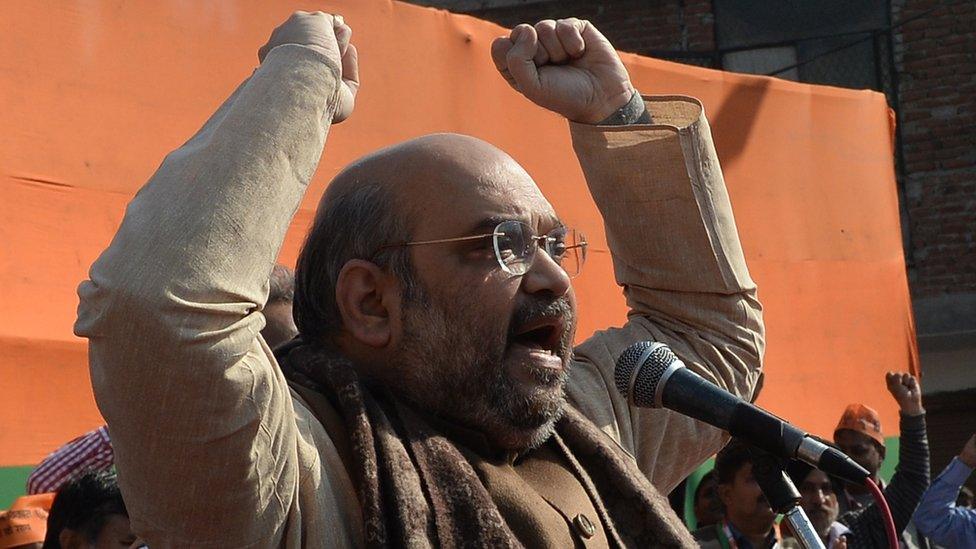
BJP president Amit Shah has said the government is committed to pass the bill
But while the BJP may seek to win many of these seats to offset possible losses in north India, it risks losing the support of the ethnic Assamese, who voted for the party in the 2016 state elections.
Assam Chief Minister Sarbananda Sonowal, himself a former Aasu leader, is on the defensive, requesting students not to join the agitation which, he says, is fuelled by "misinformation".
"Nobody will automatically get citizenship if the amendment is passed into law. The government will closely examine all applications and reject those that are not tenable," he said this week.
What are the other reactions to the bill?
India's main opposition Congress party opposes the bill on the grounds that determining citizenship on the basis of religion goes against the spirit of the constitution.
Regional parties who have joined hands with the BJP to form governments in Assam and the neighbouring states of Meghalaya, Nagaland and Mizoram have threatened to renege on their alliances because they all oppose the bill.
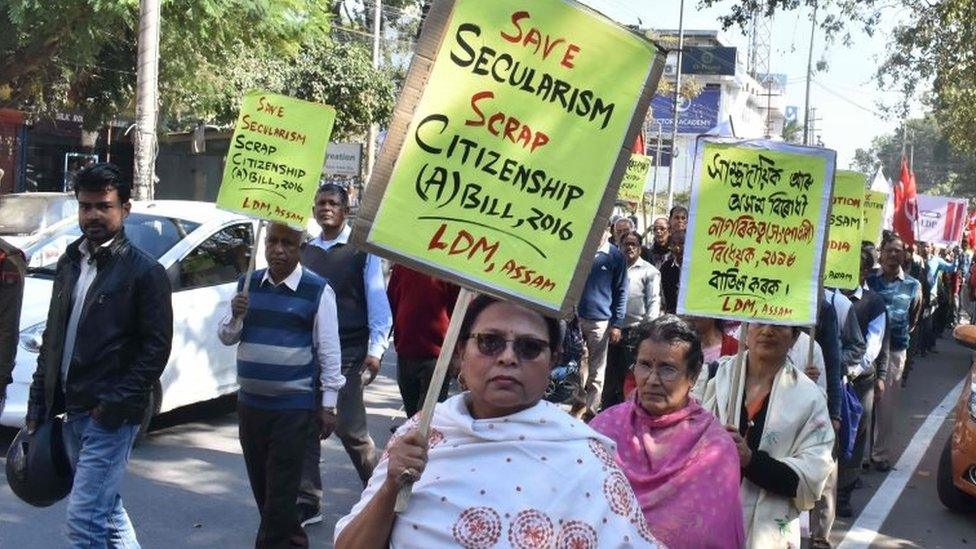
Demands to scrap the bill have been growing louder
"Anyone who came to Assam after March 1971 is a foreigner, an illegal migrant. We don't care if he or she is Hindu or Muslim. Religion is not the issue here, it is a question of protecting indigenous people from being swamped by foreigners in their own land," university student Mitali Baruah told the BBC as she marched to a protest rally.
That has been the dominant sentiment with most of the indigenous communities - a migrant is unwelcome, regardless of religion.
"The BJP has failed to understand the pulse of the region, because they see everything through the prism of religion," said analyst Samir Purkayastha.
- Published30 July 2018
- Published30 July 2018
